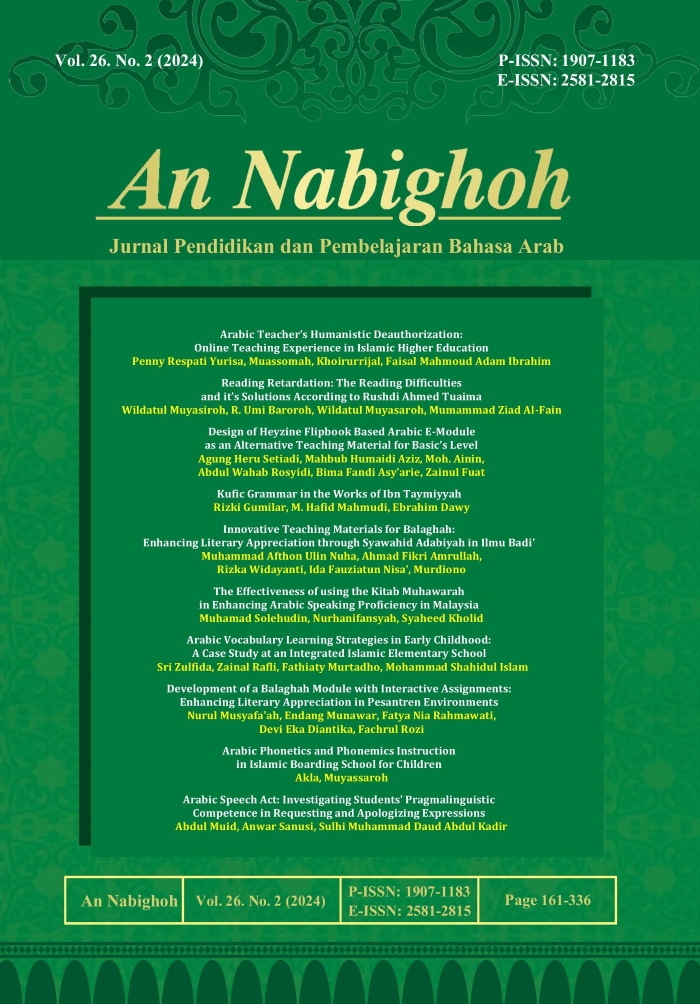Development of a Balaghah Module with Interactive Assignments: Enhancing Literary Appreciation in Pesantren Environments
DOI:
https://doi.org/10.32332/an-nabighoh.v26i2.287-302Keywords:
Learning Module, Balaghah, Literary Appreciation, Interactive AssignmentsAbstract
This study aims to enhance literary appreciation among Pondok Pesantren Adnan Al-Charis students through a Balaghah learning module. It evaluates the module's effectiveness in improving students' understanding and interest in literary materials, employing quantitative and qualitative methodologies, including surveys, interviews, and tests. Findings reveal that 85% of students report increased interest in learning Balaghah after using the module, with average test scores improving from 62 to 82, indicating significant gains in comprehension. Validation by education experts confirms the module's appropriate structure and methodology, while classroom observations show heightened student participation in discussions. Although there are critiques regarding disparities in achievement and technology access, this research underscores the module's potential as an innovative teaching model for Balaghah. Ultimately, this study contributes to developing effective teaching materials and fosters an interactive learning environment, aiming to cultivate students who appreciate the beauty of Arabic literature.
Downloads
References
Ahmed, Vian, and Alex Opoku. “Technology Supported Learning and Pedagogy in Times of Crisis: The Case of COVID-19 Pandemic.” Education and Information Technologies 27, no. 1 (2022): 365–405. https://doi.org/10.1007/s10639-021-10706-w.
Anderson, Jim. “8 Visual Art in Arabic Foreign and Heritage Languageand- Culture Learning: Expanding the Scope for Meaning-Making.” In Liberating Language Education, edited by Vally Lytra, Cristina Ros Í Solé, and James Anderson, 165–85. Multilingual Matters, 2022. https://doi.org/10.21832/9781788927956-012.
Bower, Matt. “Technology‐mediated Learning Theory.” British Journal of Educational Technology 50, no. 3 (2019): 1035. https://doi.org/10.1111/bjet.12771.
Cahyono, Machrup Eko, Nurul Musyafa’ah, Muhammad Afthon Ulin Nuha, and Muh. Sabilar Rosyad. “Articulation Methods to Increase Student Understanding in Balaghah Learning.” Studi Arab 13, no. 2 (2022): 62–84. https://doi.org/10.35891/sa.v13i2.3918.
Chua, Kj, and Mr Islam. “The Hybrid Project-Based Learning–Flipped Classroom: A Design Project Module Redesigned to Foster Learning and Engagement.” International Journal of Mechanical Engineering Education 49, no. 4 (2021): 289–315. https://doi.org/10.1177/0306419019838335.
Crompton, Helen, and Diane Burke. “Artificial Intelligence in Higher Education: The State of the Field.” International Journal of Educational Technology in Higher Education 20, no. 1 (2023): 22. https://doi.org/10.1186/s41239-023-00392-8.
Halimah, H. “Critical Literacy Approach in the Teaching of Literary Appreciation Using Indonesian Short Stories.” Indonesian Journal of Applied Linguistics 10, no. 1 (2020): 84–94. https://doi.org/10.17509/ijal.v10i1.24992.
Hardani, Nur Hikmatul Auliya, Helmina Andriani, Roushandy Asri Fardani, Jumari Ustiawaty, Evi Fatmi Utami, Dhika Juliana Sukmana, and Ria Rahmatul Istiqomah. Metode Penelitian Kualitatif & Kuantitatif. CV. Pustaka Ilmu, 2020.
Karabulut‐Ilgu, Aliye, Nadia Jaramillo Cherrez, and Charles T. Jahren. “A Systematic Review of Research on the Flipped Learning Method in Engineering Education.” British Journal of Educational Technology 49, no. 3 (2018): 398–411. https://doi.org/10.1111/bjet.12548.
Karam, Khaled Mostafa. “Conscious Application of Creativity Dynamics as an Approach to the Formation and Appreciation of Literary Creativity.” Neohelicon 48, no. 1 (2021): 313. https://doi.org/10.1007/s11059-020-00546-x.
Kuijpers, Moniek M., and Frank Hakemulder. “Understanding and Appreciating Literary Texts Through Rereading.” Discourse Processes 55, no. 7 (2018): 619. https://doi.org/10.1080/0163853X.2017.1390352.
Kurdi, Ghader, Jared Leo, Bijan Parsia, Uli Sattler, and Salam Al-Emari. “A Systematic Review of Automatic Question Generation for Educational Purposes.” International Journal of Artificial Intelligence in Education 30, no. 1 (2020): 121–204. https://doi.org/10.1007/s40593-019-00186-y.
Manshur, Fadlil. “Typical Literary Works of Pesantren on Righteousness Teaching within Cultural Transformation.” Journal of Social Studies Education Research 11, no. 4 (2020). https://www.learntechlib.org/p/218537/.
Medeiros, Rodrigo Pessoa, Geber Lisboa Ramalho, and Taciana Pontual Falcao. “A Systematic Literature Review on Teaching and Learning Introductory Programming in Higher Education.” IEEE Transactions on Education 62, no. 2 (2019): 77–90. https://doi.org/10.1109/TE.2018.2864133.
Mohammadzadeh Banitarfy, Mahdi, and Hamid Mashhadi. “Qualitative Educational Implications of Nahj Al-Balaghah on Characteristics of Effective Teaching.” Nahjolbalagheh Research 20, no. 2 (2021). https://www.nahjmagz.ir/article_141276_en.html.
Muhammad Afthon Ulin Nuha, Miftahul Mufid, Mas Tajuddin Ahmad, and Nurul Musyafaah. “Synectic Learning Model to Improving Santri’s Cognitive Ability in Balaghah Learning.” Alibbaa’: Jurnal Pendidikan Bahasa Arab 4, no. 2 (2023): 148. https://doi.org/10.19105/ajpba.v4i2.8496.
Musyafa’ah, Nurul. “Assignment-Based Balaghah Learning Module Application to Increase Literary Appreciation.” Journal of Social Science 2, no. 6 (2021): 816. https://doi.org/10.46799/jss.v2i6.250.
Rezaei Alikamar, Farid, Mohammadali Mojallal, and Jafar Ghahramani. “Designing and Validation of Curriculum Model of Medium Period Technological Competence.” Iranian Journal of Educational Sociology 3, no. 4 (2020): 11–18. https://doi.org/10.52547/ijes.3.4.11.
Santos, Joseline M., and Rowell D.R. Castro. “Technological Pedagogical Content Knowledge (TPACK) in Action: Application of Learning in the Classroom by Pre-Service Teachers (PST).” Social Sciences & Humanities Open 3, no. 1 (2021): 100110. https://doi.org/10.1016/j.ssaho.2021.100110.
Sugiyono. Metode Penelitian Pendidikan (Kuantitatif, Kualitatif, Kombinasi, R&D Dan Penelitian Tindakan). Bandung: Alfabeta, 2019.
Ulin Nuha, Muhammad Afthon. “The Effectiveness of Using the SQ3R Method in Improving Maharah Qira’ah in Balaghah Learning at Al-Muhibbin Islamic Boarding School Tambakberas Jombang.” Al-Tadris: Jurnal Pendidikan Bahasa Arab 10, no. 2 (2022): 278–303. https://doi.org/10.21274/tadris.2022.10.2.278-303.
Ulin Nuha, Muhammad Afthon, Ahmad Fikri Amrullah, Rizka Widayanti, Ida Fauziatun Nisa’, and Murdiono Murdiono. “Innovative Teaching Materials for Balaghah: Enhancing Literary Appreciation through Syawahid Adabiyah in Ilmu Badi’.” An Nabighoh 26, no. 2 (2024): 231. https://doi.org/10.32332/an-nabighoh.v26i2.231-250.
Ulin Nuha, Muhammad Afthon, and Nurul Musyafa’ah. “Implementation of Quality Management Curriculum in Arabic Learning.” Arabiyatuna : Jurnal Bahasa Arab 6, no. 2 (2022): 417. https://doi.org/10.29240/jba.v6i2.5137.
Uwoh Abdullah, Badruzzaman M. Yunus, Izzuddin Musthafa, and Isop Syafe’i. “Curriculum Development To Improve Arabic Language Skill In The Institute Of Umul Qro Al-Islam (IUQI), Bogor And The Islamic Religious Institute Of Sahid (INAIS) Bogor.” International Journal Of Humanities Education and Social Sciences (IJHESS) 1, no. 5 (2022). https://doi.org/10.55227/ijhess.v1i5.146.
Downloads
Published
Issue
Section
License
Copyright (c) 2024 Nurul Musyafa'ah, Endang Munawar, Fatya Nia Rahmawati, Devi Eka Diantika, Fachrul Rozi

This work is licensed under a Creative Commons Attribution-ShareAlike 4.0 International License.


